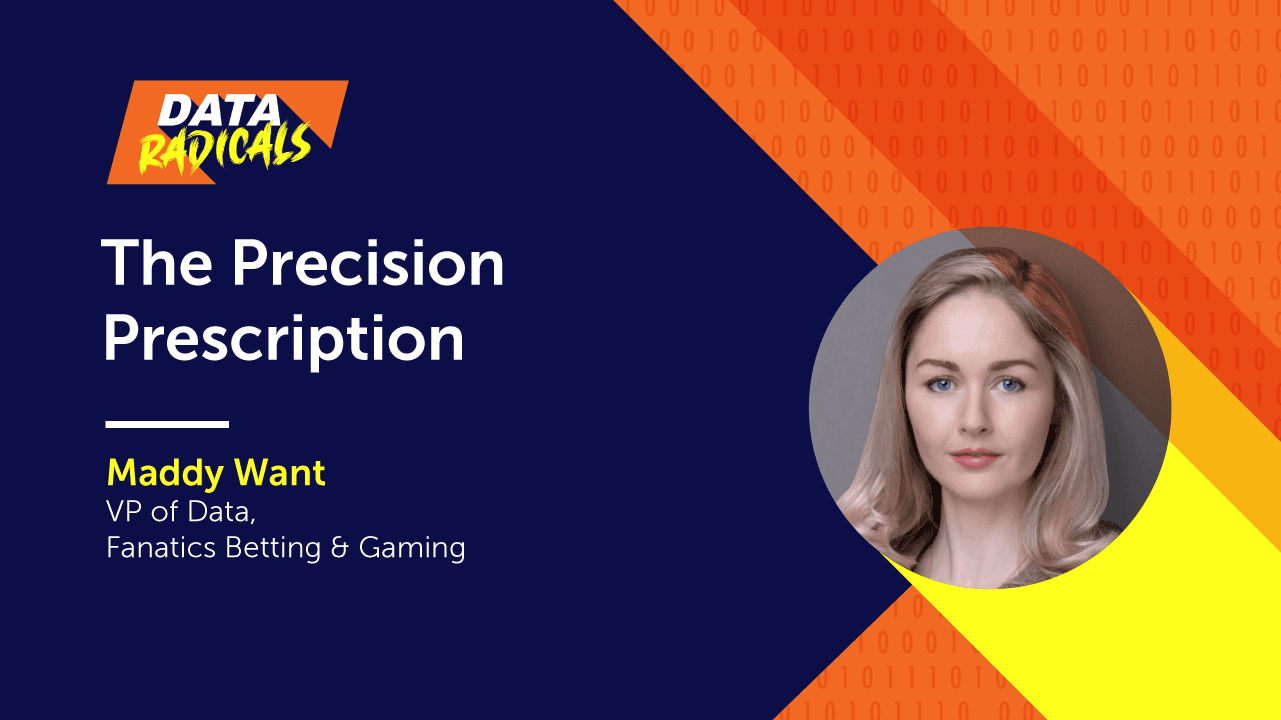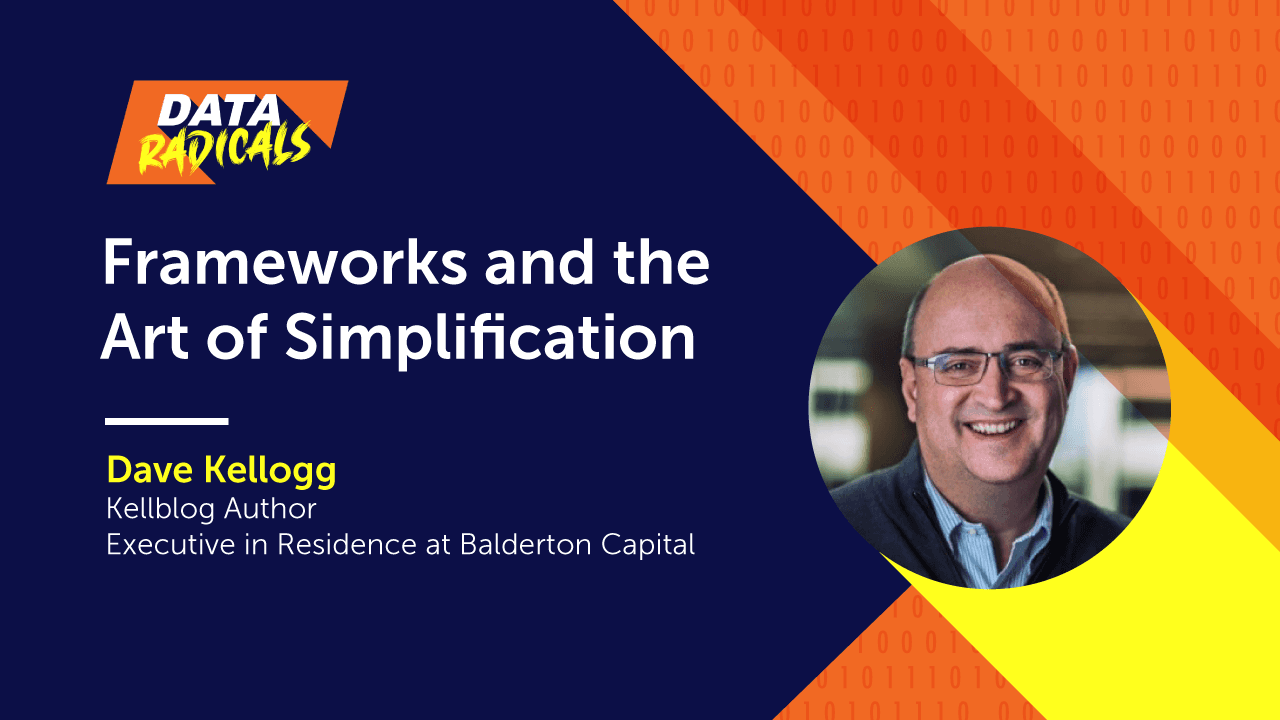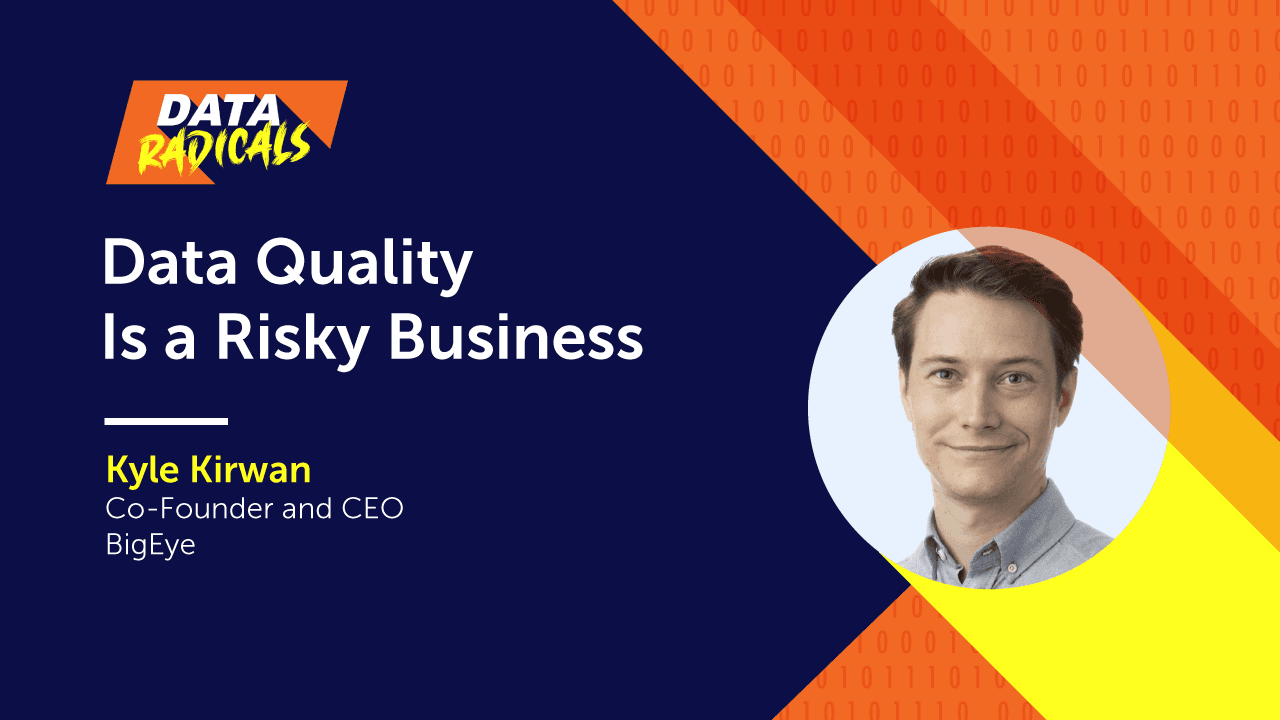Producer: Hello and welcome to a very special episode of Data Radicals. Today, we’re doing a deep dive into all things data governance, one of the most daunting topics in our industry today. We’ve gathered insights from leading experts on how to make your governance project a success. We’ll tackle everything from: basic definitions, to getting stakeholders on board and making your governance program successful. You don’t want to miss it!
This podcast is brought to you by Alation. Successful companies make data-driven decisions at the right time, quickly, by combining the brilliance of their people with the power of their data. See why thousands of business and data leaders embrace Alation at Alation.com. That's A-L-A-T-I-O-N-dot com.
Data Governance Can Be Seen as a Challenge
Producer: Data Governance can be seen as a huge challenge. Our first expert, Bob Seiner, President and Principal of KIK Consulting, shares how he makes it more digestible to skeptics.
Bob Seiner: One of the biggest challenges that I see is that organizations, especially in the field of data governance, that's a scary word to a lot of people. Governance is like government. It means there's going to be rules. There's going to be bureaucracy. I like to take the approach of your organization wouldn't be in the situation that it's in right now, from a positive perspective, if you had a complete lack of governance.
So if we start with a premise that there's already governance taking place or management taking place, it's just very informal, I found that that was an easy problem to solve. It was a challenge that people were scared of data governance, but if you temper that and make people understand or help people to understand that there's already management taking place, you already have data, it's not that difficult of a challenge to address.
Producer: Michelle Hoiseth, former CDO of Parexel, recommends avoiding the word entirely, instead using the more positive term, “data enablement.”
Data Enablement: The More Positive Term for Governance
Michelle Hoiseth: We were, very much, very careful about using language around data enablement, not data governance. Yes, there’s a certain amount of this, of course, that’s about control. But it’s control and service to the aims of the business. It’s not a gate control for the sake of pure defensive posture. As a business, we needed to be able to do more with our data. It’s been an educational journey and it had to be timed with the advanced analytics initiatives. Everybody was aware of what we were investing and why, and the potential they held. And, if we failed to bring them along on the data story with it, they were not going to succeed.
Producer: Paola Saibene, Principal Consultant at Resultant, agrees with Bob that this vital work is likely already underway at your company. And like Michelle, she agrees that what you call it matters.
Paola Saibene: The definition of data governance is quite nebulous. So, depending on industries sector, depending on who you ask, you'll have different folks that refer to different frameworks, but just think of it differently. So we just look at maturity of the data and if it fits to have a full on data governance engagement.
Great. If it's more of a quality engagement, great. If it's more of a catalog, you can get. Then at that is the right spot for that to start and mature. Um, so no, we don't always call it a governance, but we do explain that this governance by design, thinking about putting the right rules in place so that you can expedite, whatever you need to do is super important. And the design of that takes a bit of skill and experience. And instead of multiplying that effort, you can have it all consolidated and just engage quickly.
Producer: Like Michelle, Paola acknowledges that people don’t often embrace data governance. So tying its value to the business becomes doubly important.
Paola Saibene: Data governance is not something that makes most people just say, "Wow, I really want to do data governance today. I'm so excited about it." It doesn't quite happen that way. Making sure you are, in this case, conveying and providing clarity as to why it is propelling the organization forward.
Producer: Changing how people perceive governance can go a long way. Bob recommends you kick off your initiative by emphasizing that it doesn’t have to be painful or restrictive.
Bob Seiner: I think that most organizations think that governance has to be top down. And that's why I've spent a lot of my career helping organizations to understand that there is an alternative approach, that you can look to leverage things that already exist within your environment first and then apply the heavy-handedness wherever you need to. But if you can stay less demanding and you can build it into what people do... I always joke that if you consider data governance a game, you've won the game when you build it into what people do, rather than making it feel like it's over and above what they're presently doing. That's the difference between assigning somebody into a role and recognizing somebody into a role.
…And if you think of it in terms of being radical, yeah. Maybe this is a radical approach to governance, but it's not really that radical. It's really very common sense. And I'd rather see common sense than to take this heavy-handed approach.
How CDOs Should Lead the Execution of Data Governance
Producer: To most of us, data governance feels like common sense. It’s the execution that can be tough. Jennifer Belissent, Principal Data Strategist at Snowflake, shares how CDOs must lead the charge.
Jennifer Belissent: CDOs have a mandate across the data value chain, across that whole life cycle of data. And really, you talked about data governance. Data governance extends also across that life cycle. It's not just about security or privacy or ensuring data quality, but it's also ensuring that the right people have access to it and that the right people can use it for driving value, delivering value to the organization.
So at Snowflake, we talk about three pillars of data governance. It's knowing your data, protecting your data, but unlocking your data and ensuring that people can collaborate securely using that data. So both the CDO really reflects that holistic end to end view of data governance today as they have to go across that whole spectrum. And I do think that most of them today understand that or increasingly some. One of the things that we've seen, particularly in the US, is that the CDO is increasingly reporting to the CEO, the chief executive in an organization. And that does reflect more of the strategic view of data as a strategic asset and the CDO really driving that effort within the organization.
Producer: Once that strategy is in place, next comes implementation. Bob offered some tips on how to communicate data governance to newcomers.
Bob Seiner: The way that I break down communications associated with governance, I categorize it into the three O's I refer to. We need to orient people to the whole concept of governance and why it's important and the value that's going to come from it and the approaches that are available to be followed. The second O is onboarding. People need to... You can't go out and tag a data steward and tell them, "Okay, go do steward stuff," because they're not going to understand what that means. So we need to onboard them appropriately, depending on what role they're going to play within your organization. So that onboarding type of communications. Let's orient them, let's onboard them. And then let's provide them ongoing communications that tells them how successful has the organization been. What problems have we solved? What opportunities have we addressed?
A Governance Plan Demands Major Decisions
Producer: A governance plan demands some major decisions. Wendy Turner-Williams, former CDO of Tableau, shares her approach.
Wendy Turner-Williams: I'm a person who believes in right-size governance and also believes in kind of governance automation. I think when it comes to scale and volume of data in the modern world, manual processes just don't scale, whether it's for quality or whether it's for policy, or stewardship, in stewardship, driving access control, this is all about automations and all about the platforms to automate those things.
From my perspective, I tend to focus on: What are those processes? What are those automation points? And then how do I actually build those in an intuitive way, almost like an application experience that really bakes into an intuitive user experience so that the process piece or the governance aspect is almost buried into just the data engineering life cycle or the data analytics life cycle? And it just becomes an intuitive piece to where we're guiding people to what they want, and what they need, and the processing that they need to do. And governance is almost like baked in around them, in a way that they can't quite see it, but all of the right things are happening from a handling perspective or a policy perspective intuitively.
Producer: Governance has exciting implications for other use cases. Francesco Marzoni, CDAO of Ingka Group of Ikea, believes governance is key to making data FAIR: findable, accessible, interoperable, and repeatable. Here’s a short clip of him and Satyen discussing this radical approach to governance.
Is FAIR Just Another Form of Data Governance?
Satyen: Is FAIR just another form of data governance or a replacement for data governance or complementary to it — or how do you think about that?
Francesco Marzoni: First of all, I think, of course, the concept of authority is important, especially in a big organization because, otherwise, without that, we might have chaos. Nevertheless, I have to say, my entry point is always around duties rather than rights when it comes to accountability around data. So, ultimately, authority needs to be linked to who has the duty to do what with which data and a bit less about who has the rights to do what with which data because, at the end of the day, the rights on data should be more defined by a policy rather than by specific individuals.
But then, to your point regarding the link between FAIR data and the concept of data governance, I think the interlink is total. I would probably think about FAIR, though, as one, a framework to measure what you want to govern — so how you set goals and how you say, “Okay, I achieved that goal on this specific data set with my governance, so now it is findable, so now it is accessible, now it is interoperable.” It’s also about … you need governance to ultimately then establish all those base practices that are needed to deliver FAIR data. So, without the governance, most likely, you will not have master data management, you will not have metadata management — and without those you cannot bring simply the FAIR concept to life in a real way.
Satyen: When I heard the original concept of FAIR, it was insightful for me because I remember back to a conversation I had with this guy, Andrew White, who’s a Gartner analyst. I don’t know if you know him. But very early in our journey, got on the phone, and we were just learning about what data governance was and were thinking about the space, and he said, “Satyen, you just have to remember that there are really only eight data governance policy types, and I’ve written about this, and you should just go read my article.” So, of course, I go and read the article, and all of these policies, as it turns out, are about very negative things. There’s a security policy type and an access policy type and a privacy policy type and a data quality policy type and a retention policy type.
It strikes me that FAIR has the ability to complement that framework by adding maybe four other or five other policy types, basically, around what does it mean for something to be findable, what does it mean for something to be accessible, how do we measure that, and how do we say, “Oh, if it is findable, then it has the following three elements of metadata,” and that could be a policy through which then a data steward could apply authority and review. So it does strike me as a way of extending data governance to be something that’s actually quite offensive and differentiating and empowering as opposed to simply being this thing that’s all about restricting people’s access to data and making sure that risk is at the forefront of everyone’s imagination.
Francesco Marzoni: I love what you say, and I would add that, indeed, the four letters of FAIR allow you also easily to build stories around how each of those characteristics of data, from findability to reusability, can have a one-to-one link with how you can unlock a specific value for your organization if that condition is verified and how much, instead, the organization might suffer if that condition is not verified.
How to Embrace a Data Governance Change
Producer: So how else can you get folks to embrace a data governance change? For Paola, it comes down a universal desire for trustworthy data.
Paola: …I heard it best just a week ago from one of our clients: “I just want certified data.” That resonates with a lot of people. It may not be the definition for everyone, but I think it works for many people. Is there a stamp of approval for data to run in my business analytics, in my automation, in my AI work? Because then I’ll know the data is good. That certification process comes with quite a bit of work in the background. But I thought that that simple two-word phrase was perfect.
Producer: Data governance is a critical part of a Data Radical’s mission. Bob had some final thoughts on why it should be central to your company’s business strategy.
Bob Seiner: These things aren't going to happen on their own. The data is not going to govern itself. The data is going to do what we tell it to do. I had a good friend of mine many years ago referred to... He said, "We shouldn't even call it data governance. We should call it people governance because we're governing people's behavior associated with the data… And so we need to make an effective effort to govern the data.
Data Is Not Going to Govern Itself
Producer: Data is not going to govern itself. As Data Radicals, that’s our charge moving forward. Luckily, we have a ton of experts to help us navigate this ever evolving landscape.
We hope you enjoyed this special episode of Data Radicals. Until next time.
This podcast is brought to you by Alation. The role of the chief data officer (CDO) is more vital — and challenging — than ever before. Alation offers a vision for building a strong data culture that empowers people to find, use, and trust data.
Other episodes you might like

Season 2 Episode 20
The Precision Prescription
Want to increase your odds of successfully ramping up a data team at your organization? With advice from Maddy Want, VP of data at Fanatics Betting & Gaming and co-author of Precisely, it’s a sure bet. Maddy explains how turning data into a valuable asset requires anticipating challenges in scaling as well as preserving team and company culture as the pace of growth accelerates.
Watch now

Season 2 Episode 14
Frameworks and the Art of Simplification
If you know technology marketing, you know Dave Kellogg. The Kellblog author is an expert in tech marketing, sales, and how to evolve with your industry. Yet with all he’s learned, his advice for data leaders boils down to “Keep it simple.” In this chat, Dave offers his insights to simplify, from building frameworks to identifying your “crux challenges.”
Watch now

Season 1 Episode 13
Data Quality Is a Risky Business
Growth in any industry usually requires innovation. But when you challenge the status quo, you encounter different levels of risk. Bigeye CEO and former Uber data scientist Kyle Kirwan details his experiences on finding the balance between innovation and risk.
Watch now
